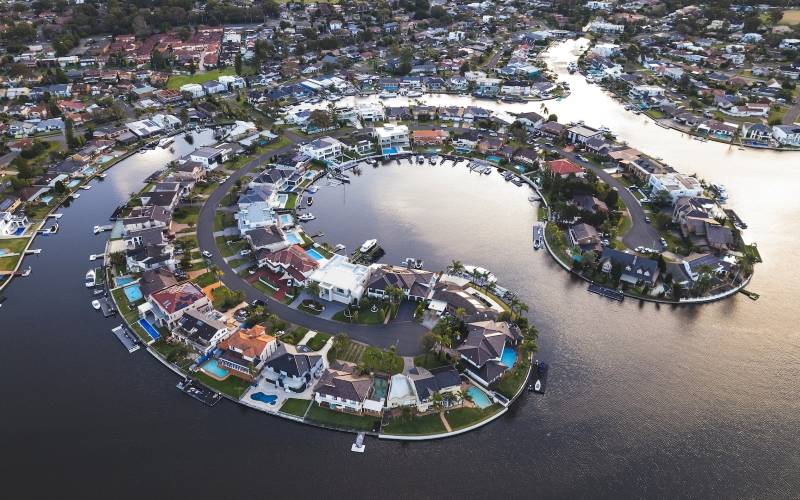In his appearance on the Savings Tip Jar podcast, the shadow housing minister tore apart the government's proposal to invest $10 billion and use the returns to build social and affordable housing.
Both the Greens and the Coalition are in opposition to the policy, which Mr Sukkar likened to a Ponzi scheme, and said the government is banking on the majority of the Australian public not understanding how the proposal will work.
"[Borrowing the $10 billion] costs us about $400 million in interest each year...it probably costs another $100 million on a management fee that the future fund charges the Commonwealth," Mr Sukkar explained.
The $400 million figure Mr Sukkar arrived at is derived from the 10 year treasury bond yield, which sat at 4.07% overnight.
"It's costing Australian taxpayers about $500 million per year, and then it's the hope that that will return in that fund an amount above that $500 million that can then potentially be distributed into social and affordable housing," Mr Sukkar said.
"We think it's a bit of a Ponzi scheme...it's been engineered to make it sound like they're spending $10 billion on housing.
"[The Government] are hoping that a lot of people out there just hear the $10 billion and make the assumption that [the government] are doing something huge for housing, which we know they're not."
The government intends for the proceeds from the fund to go towards building 30,000 new affordable homes over the next five years.
However, Mr Sukkar pointed out there is no guarantee of positive returns.
"Had this fund been set up last year, it would have lost money," he told the podcast.
"Not only would there be no money for social and affordable housing, the $10 billion would have gone backwards because the Future Fund shrunk in a tough economic environment.
"Our point has been that if a government is going to invest in social affordable housing, it should do so directly."
Note: The offices of Housing Minister Julie Collins MP and Greens housing spokesperson Max Chandler Mather MP were contacted but they have not yet responded.
The existing Australian Future Fund was established in 2006, aiming to strengthen the long term position of the Australian government.
Mr Sukkar's other point was that even if the Housing Australia Future Fund succeeded in building 30,000 new homes, this isn't particularly impressive compared to the recent past.
"They're seeking to build 6,000 homes a year for the next five years. We built more than 6,000 social and affordable homes per year, when we were in government," he said.
Building affordable homes state government's responsibility?
Mr Sukkar was asked about the nine years the Coalition had in power, and the lack of social and affordable housing that was built during that time.
Despite his comments that the federal government should just build it, he said it was the responsibility of states.
He said federal involvement in this area was a relatively recent development.
"[State governments] are the ones who own the stock, they're the ones who manage department housing," he said.
"It was the home guarantee program which I established and set up in the first six months of the Morrison Government in 2019 to the first home super saver scheme, we directly enlisted more than 300,000 people into a first home."
However, these schemes address accessibility in helping borrowers with a deposit and their home loan, not necessarily building stock.
Help to buy scheme 'not particularly exciting'
Mr Sukkar also discussed the Albanese Government's Help to Buy shared equity scheme, which should start next year.
Under the scheme, the government will make an equity contribution towards eligible Australian's property purchase.
To qualify, individuals need to be earning less than $90,000 per year, or $120,000 for a couple, and the government will contribute up to 40% equity for a new property, and up to 30% for an existing one.
When the property is sold, the government is entitled to an equivalent proportion of the sale, including any capital gains.
However, homeowners wouldn't pay any rent or interest on the government's portion of the property.
Mr Sukkar does not believe this is something particularly attractive for the majority of Australians.
"History tells us that most Australians don't view [co owning property with the government] as something they aspire to in their lives.
"There's a lots of questions that are unanswered, you know, who carries the repairs and maintenance?
"If you get a pay rise, and all of a sudden your income is above the threshold of the scheme, are you then forced to dispose of the home?
"You might be forced by government to sell your share of the home; [there are] a whole lot of questions that aren't answered."
When the policy was first announced, Savings.com.au sought clarification from Treasury and the Housing Minister Julie Collins MP on these associated costs, who said this falls on the borrower.
If their income rose past the threshold, the borrower would need to work out with their lender an equity repayment schedule.
Image by Jeriden Villegas via Unsplash

Ready, Set, Buy!
Learn everything you need to know about buying property – from choosing the right property and home loan, to the purchasing process, tips to save money and more!
With bonus Q&A sheet and Crossword!


 Harrison Astbury
Harrison Astbury
 Harry O'Sullivan
Harry O'Sullivan